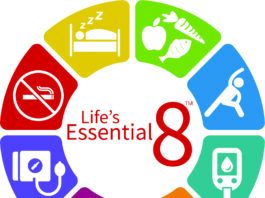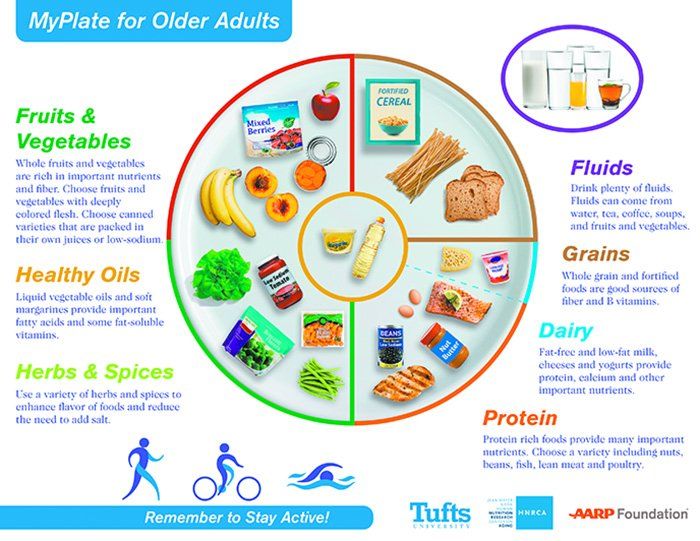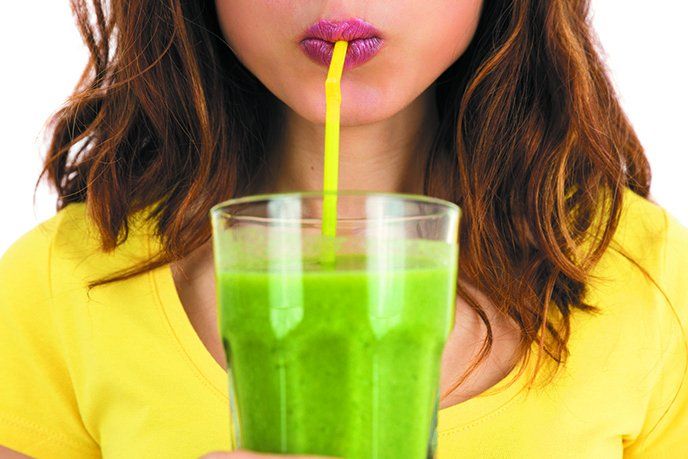Drink Up to Stay Healthy and Hydrated This Summer
Every cell in your body needs water to function. Water transports nutrients and oxygen throughout the body, and carries away waste materials. Water makes up most of your body, ranging from about 75% of body weight in infancy to 55% of body weight at older ages. Your brain and heart are almost three-quarters water, your muscles and kidneys are almost 80% water, and even your bones are about 30% water.
Updated Nutrition for Older Adults
If you've got your AARP card but you're still eating the way you did in your 20s, it's time for your diet to act your age. While most nutritional guidance is "ageless," you do need to make some adjustments to fit the changing needs of your aging body.
2015 Dietary Guidelines for Americans: The Good, the Bad and the Ugly
[IMGCAP(1)] Earlier this year, the federal government released the new Dietary Guidelines for Americans (DGAs). (See our March Special Report.) As a cardiologist, public-health advocate and nutrition scientist, I see a lot of good in the DGAs. First, the DGAs emphasize healthful eating patterns and foods. This is an advance over past guidelines, which focused more on isolated nutrient targets. Modern nutrition science tells us that, for preventing major diseases like obesity, diabetes, heart disease and cancers, its…
Secrets of Uncle Sams Nutrition Prescription
Every five years, your Uncle Sam rounds up the latest scientific evidence about nutrition and serves up advice about what to eat and drink for better health. The resulting Dietary Guidelines for Americans (DGA) - whose eighth edition was released in January - provides basic guidance to the American public about healthy eating patterns and shapes nutrition education programs.
Smart Supermarket Seafood Shopping
When it comes to planning your meals, it's hard to beat seafood as a nutritional powerhouse. Seafood is rich in protein and other important nutrients. Prepared right - without frying, breading, tubs of butter or caloric sauces - it delivers these nutritional benefits without a lot of calories. Many varieties also contain heart-healthy omega-3 fatty acids.
What About Canned?
When the supermarket fish counter fails you, dont hesitate to head for the canned-fish aisle. Canned sardines and salmon are generally sustainable choices; canned tuna, while controversial, typically includes sustainable pole-caught albacore or skipjack varieties.
“Foraging” in the Modern Supermarket
There's good news at your local grocery store. "You should walk into a supermarket with a very positive attitude," says Alice H. Lichtenstein, DSc, director of Tufts' HNRCA Cardiovascular Nutrition Laboratory and executive editor of the Tufts Health & Nutrition Letter. "The availability of healthy and affordable foods has greatly expanded in recent years. There are a lot of options now throughout the store that are really good choices."
Do You Really Need to “Detox”?
While theres something to be said for clean eating, the "detox" fad needs a reality check. "First, your body already has a highly effective system for removing toxins, principally the liver and kidneys," explains Irwin H. Rosenberg, MD, University Professor of Medicine and Nutrition at Tufts. "Second, diets and products that claim to detox the body do not identify what supposed toxins are being targeted."
Expert Tips for Nutrition-Smart Holiday Travel
If you're planning to join the holiday travel crush - or already looking ahead to 2016 vacations - there's good news about your eating options en route. "I actually think that airport choices are beginning to improve a bit, both in terms of take-out and sit-down options," says Jeanne Goldberg, PhD, professor at Tufts' Friedman School and director of the Nutrition Communication Program. "The onus is to choose among the better options."
Stop Worrying About Total Fat
Two of the nations leading nutrition experts have some advice for the federal government: Stop worrying about total fat. Nutrition research has shown that the emphasis on restricting total fat intake is outdated, yet these limits affect everything from Nutrition Facts labels to school lunches to supermarket products. In recent opinion pieces in JAMA and the New York Times, Dariush Mozaffarian, MD, DrPH, and David S. Ludwig, MD, PhD, argue, Its long past time for us to exonerate dietary fat.

































